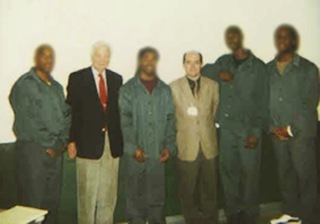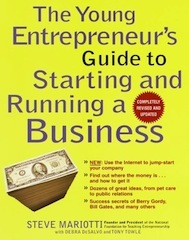It all started in 1993. NFTE had about 1,000 copies of The Young Entrepreneur's Guide to Starting and Running a Business that were going out of print, just as we finished our newest curriculum. Instead of storing the books, we decided to donate them to the New York Department of Corrections.
For 25 years I have volunteered in prisons, but I never expected the response we received in '93 -- one that sparked a 20-year correspondence between NFTE and incarcerated men throughout the country.
At first, the letters came in intermittently, one or two every week. Some came directly from inmates responding to the donated books, others through ITEM (Inmates Teaching Entrepreneurship and Mentoring). ITEM, a program I co-founded in 2004 with Joe Robinson, trained inmates in the basics of financial literacy. Joe's genius wasn't just to teach inmates how to start and run their own businesses, but to strategically help them re-engage with their family, particularly their children. When a man is released he is given around $40 and a bus ticket to the city in which he was arrested. Because 70 percent of men released from prison will be locked up again within two years, this program was paramount.
Now, the letters come almost every day, and NFTE has since received over 10,000 letters from men in prison. Yet, these letters are more than just requests for more books on entrepreneurship, or notes of thanks for the donations. They express a hopefulness inspired by their newfound knowledge of entrepreneurship, and offer us a rare chance to hear directly from men whose lives have been stunted by incarceration.
(Source: http://bit.ly/1cqrYMK)
The voices behind the statistics
About five months ago, I enlisted the help of my friends Victor and Meredith, professionals with invaluable experience working within women's prisons. Together, we read over 500 letters received from 2009 to 2013. Meredith and Victor then selected 70 letters that gave special insight into the roots of American male imprisonment.
The findings were both fascinating and depressing. Ultimately, the letters confirm what we already suspected about the pathways to prison: a life of poverty, drug-related crimes, and unstable home environments. What was most notable, however, was their relationship with education. These histories did not mention mentorship, or a powerful -- let alone consistent -- engagement with education. As an educator and advocate for at-risk youth, I was particularly struck by their various expressions of detachment from and discouragement with the education system.
Meredith-Lyn Avey (above) leads the study based off of the letters received by men in prison
Our country holds close to 7 million adults who are either incarcerated, in jail, on probation or parole. This is 1 in every 35 adults who live under the shadow of the United States correctional system -- 1 in every 108 adults are actually incarcerated (now roughly under 2.3 million) leaving 2.7 million children with parents in prison.
Family income of fathers who are incarcerated average at 22 percent lower than a year before their incarceration, and their children are also more likely to become expelled or suspended from school -- interrupting their education and affecting their economic mobility.
All 70 letters express similar cyclical stories. Some men describe they had gone in and out of school to eventually make it to higher education before their arrest, yet never reached graduation. Some face their financial pressures alone, are depended on by their family upon their release and are concerned about being current "indigent."
(Source: http://bit.ly/1d6jKF6)
One young man spoke about losing interest in education, gaining a full-time job, and still searching for means to make ends meet. He "fell into the streets," dealing drugs and robbing to make money, "losing faith" and dropping out: "My mind wasn't focused on school, it was concentrated on the streets... I went to school by day and sold drugs and robbed, or did whatever to make money after school."
When I started NFTE, one of my main goals was to address our current education system, and how it fails youth just like it failed these very men. In the age of education reform, it seems seldom (if any) thought is given to what the millions of children that drop out of school every year want to learn. Therefore, a logical step in correcting this issue may be to ask those who are dropping out what would motivate them to stay in school.
The Young Entrepreneur's Guide to Starting and Running a Business
Reading letters of hope
The letters read unanimously of self-employment, however not a single individual identified themselves as an entrepreneur! This tragically limits their ability to get out of the drug industry and start a legitimate business. However, they show a re-kindled creativity and desire to pursue their entrepreneurial dreams: "I'm trying to learn things... on running a business so that I can grow... and make a better life for myself and others."
Within the pages of these letters, they disclose their immense will to learn, and their natural talents as entrepreneurs. Some are passionate to start nonprofits for youth who that they worry may fall prey similar channels of confinement. Most profound, however, is their eagerness to learn more and their hopefulness to become a productive part of society -- where they can share and carry out their visions and give back to their communities.
One individual wrote about how entrepreneurship ignited a "flame" inside of him, giving him the ability to realize that he too could have the power to start a business. Out of 500 letters, 200 proclaimed an awakening spurred by their found entrepreneurship knowledge: "I am a born entrepreneur, Mr. Mariotti, and this non-profit is just the beginning of what I aspire to do."
(Source: http://bit.ly/1hN7iyG)
The men redefine themselves as humans more than just an "incarcerated male" or "indigent" prisoner. Stepping out of their current labels they announce the will to "end the cycle" of prison.
So I question: If they were given financial guidance and entrepreneurship education, could the fate of these men been different?
Special thanks to Meredith-Lyn Avey, Victor Job, and Lauren Bailey for their assistance on this article.






